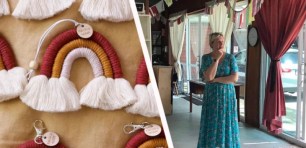
Artists Renton Bishopric and Clare Botfield are the founders of Pottery for the Planet. Source: supplied
It’s 2017 and eyeballs across Australia are transfixed to a tram filled to the brim with takeaway coffee cups — some 50,000 of them — so tightly packed into the carriage that the endless duplicates of the familiar receptacle are jammed up against the windows.
It’s then that ABC’s War on Waste host Craig Reucassel lands the devastating blow: this is the amount of single-use coffee cups Australians consume every 30 minutes, making coffee cups the second-biggest contributor to litter (behind plastic bottles).
It was a turning point. Suddenly, reusable coffee cups exploded in popularity and so did the demand for Sunshine Coast potter Renton Bishopric’s products, requiring him to increase staff at Pottery For The Planet from one part-time employee to 10 in six months.
“We couldn’t keep up, we had a waiting list of cafes all around Australia and New Zealand, we just couldn’t produce enough,” he remembers.
The second-generation potter had been working professionally for nearly 20 years by this stage — his folks run Nob Creek Pottery where he trained as an apprentice — and the hard work was finally paying off for him and his partner, artist Clare Botfield.
The lifelong environmentalists were beside themselves with excitement about the traction of conscious living, and what it could mean for a greener, cleaner future for the planet. But in 2019 news started circulating about a dangerous new virus hitting our shores.
The momentum of the reusable cup was suddenly stunted by emerging information that suggested that the COVID-19 virus could live on surfaces, and suddenly cafes countrywide were banned customers’ reusable cups on health and safety grounds.
“It was devastating to watch the traction that the zero waste movement had gained just disappear overnight,” Bishopric says.
“And it was heartbreaking for those working in the hospitality industry. Many had become very passionate about the change they were creating in consumer habit, and they could no longer be passionate about something that had become very important to them, and to their customers.”
Like so many other Australian businesses plunged into the devastating economic consequences of restrictions, his bottom line at Pottery For The Planet bottomed out.
“We were business as normal on the Friday, flying along, but by Monday afternoon the phone hadn’t rung all day, we’d packed all the orders in the system, and by Tuesday the staff were asking ‘what do you want us to do’,” Bishopric said.
“As a business, we’d become very exposed to a situation where we offered one product to one outlet — reusable cups to cafes.”
Cashing in on homewares boom
Bishopric decided to adapt to the new market conditions while keeping the green dream alive, and it was largely down to the fact that, as a pottery, the business was a retailer, wholesaler and manufacturer in one.
“As a business, this instant shift pushed us in a new direction. As a manufacturer, we could pivot very quickly and our production team quickly jumped to action and began producing a range of homewares,” he says.
And Bishopric’s knack for being in the right place at the right time paid off a second time. Demand for homewares exploded during the pandemic as people returned to their homes en masse amid restrictions and feathered the nest.
“People began renovating not just kitchens but all parts of the home. And with that, we saw a rise in demand in dinnerware for their new spaces,” he says.
Suddenly, Pottery For The Planet could bring on extra staff again. It went from eight staff at the beginning of the pandemic to 18 staff two years later, in three locations — Noosa (in Queensland), Dunsborough (in southwest WA) and Auckland, New Zealand (where about 10% of his sales are made).
Bishopric also works with a small family-run pottery in Vietnam. During the pandemic, he was its only customer and didn’t take for granted the 20 offshore staff he was supporting there too.
As Australia returns to normal — or rather, embraces the new normal — the uptake of the reusable cup is steadily increasing again, and Bishopric has just partnered with the Climate Council (which’ll get half of the proceeds) to launch the limited-edition Sunny Day Cup.
It’s marketed as Australia’s first commercial solar-fired travel cup and it’s created using a solar-powered kiln (rather than a gas-fired one), which was made possible after Bishopric installed some 98 solar panels on the rooftop of his Noosa headquarters last year.
Electricity bills plunged
Installing solar panels was an environmental, not commercial, decision, he says, but the incredible cost-saving that Pottery For The Planet has experienced doesn’t hurt either.
“Our electricity bill last year would’ve cost us just under $5000, but it actually ended up costing less than $600, even though we were running a 400-square-metre commercial operation,” he says.
The solar panels are now producing twice as much electricity as the business needs, and the company is working towards replacing all of its gas kilns — worth $15,000 each — with electric kilns over time to reduce the carbon footprint (and bills).
Bishopric says the installation of the panels was straightforward — “Adam and the team at Home and Energy in Noosaville sorted us out” — and urged other business leaders thinking about making the solar switch to go local.
And besides, it’s only a matter of time, he says, until your customers will practically demand an environmentally-friendly product.
“From a climate perspective, there’s no time for stalling on this shift. And for those who don’t jump on board they will find themselves in the near future forced to act by consumer-led demand for greener practices,” Bishopric says.
“The responsibility, as both an individual and a business owner, to do all one can to reduce our impact on the environment has never been more pertinent. And the most exciting part of where we find ourselves as a society is that we have the technology that allows us to do this easily and cost-effectively.
“In addition to this being a fantastic decision for our environmental outcomes, this shift for one’s business now makes complete economic sense as well.”
Handpicked for you

This Gold Coast business is helping showcase the creativity of locals and keeping it sustainable



COMMENTS
SmartCompany is committed to hosting lively discussions. Help us keep the conversation useful, interesting and welcoming. We aim to publish comments quickly in the interest of promoting robust conversation, but we’re a small team and we deploy filters to protect against legal risk. Occasionally your comment may be held up while it is being reviewed, but we’re working as fast as we can to keep the conversation rolling.
The SmartCompany comment section is members-only content. Please subscribe to leave a comment.
The SmartCompany comment section is members-only content. Please login to leave a comment.